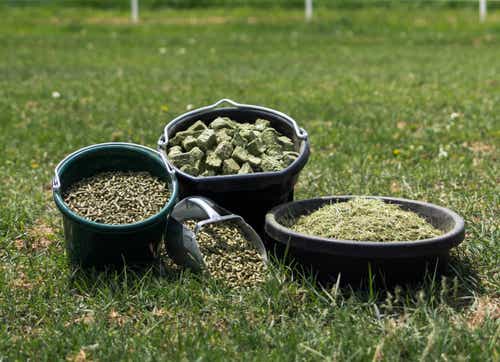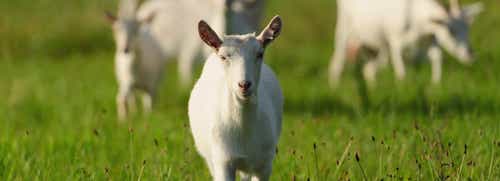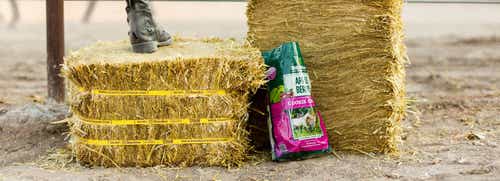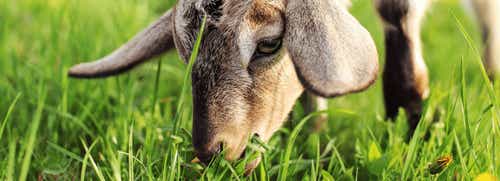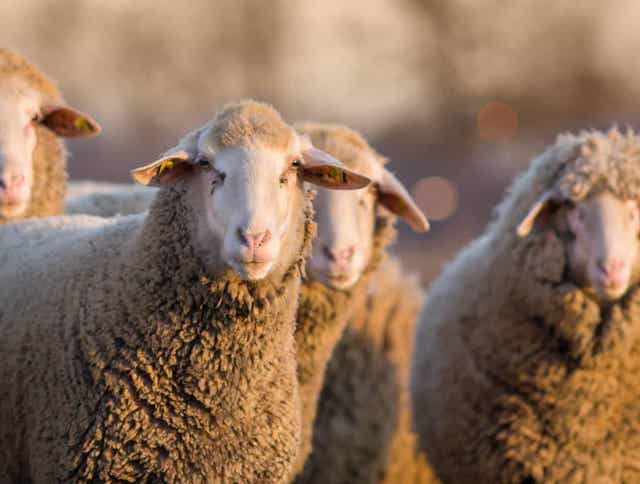
Feeding Sheep – What You Need to Know About Forage and Winter
Sheep are ruminant animals, like cattle, meaning they have a four-compartment stomach designed to ferment and digest plant fiber (pasture/hay). The four-compartment stomach retains fiber long enough so bacteria and other microorganisms can ferment and digest it. This fiber digestion process features rapid fiber intake, followed by hours of regurgitating, re-chewing and re-swallowing of the partially digested fiber.
With a digestive system uniquely designed to digest fiber, sheep rely heavily on quality fiber to satisfy their nutrient requirements. In fact, sheep can easily meet their nutrient needs when fed high quality fiber (pasture/hay), a free-choice trace mineral salt (designed for sheep) and fresh, clean water. Daily fiber intake can range from 1.75% of body weight to nearly 4% of body weight, depending on the quality of fiber available and their reproductive status. High-quality fiber is important since sheep, when given the opportunity, are selective eaters. On a pickiness scale, sheep fall somewhere between goats, as the most selective eaters, and cows, being the least selective eaters.
Forage Selection in Winter
Plant fiber source selection for sheep depends on the lifecycle of the sheep and season of the year. When high-quality pasture is available, primarily during spring, summer and fall, sheep will utilize pasture plants, both grasses and legumes, as the primary source of nutrition. In the winter months, when high-quality pasture is not available and during times of peak nutrient requirement, stored forage (alfalfa, alfalfa/grass mixed and grass) becomes the major nutrient source to meet their needs.
Grass Forage
High-quality grass forage, such as timothy or orchard grass, are excellent nutrient sources for sheep that are not nursing or are in the early stages of pregnancy (first 15 weeks). These animals have low maintenance nutrient requirements and can be fed grass forage during the early winter months prior to lambing. Feeding mixed (alfalfa/grass) forage or pure alfalfa forage may provide too many calories to sheep, causing them to become overweight.
Alfalfa/Grass Mixed Forage
These forages contain more calories (energy) and protein compared to grass forages. Alfalfa/grass mixed forage is an appropriate choice for ewes as a flushing diet. The flushing diet is fed beginning two weeks prior to breeding and for the first three weeks of the breeding season. The flushing diet provides extra energy and protein, which cause ewes to ovulate more eggs, resulting in ewes giving birth to twin lambs rather than single lambs. Alfalfa/grass mixed forage is ideal for ewes in late pregnancy since the bulk of fetal growth occurs during this time. It also becomes the “go-to” forage choice in late winter and early spring prior to lambing.
Alfalfa Forage
The straight alfalfa forages contain more energy and protein compared to grass forages or alfalfa/mixed forages. High-quality alfalfa is the forage of choice for ewes during lactation. During lactation, the ewe is producing milk, often for multiple lambs, and repairing reproductive tissue, which requires more calories to maintain body condition. The high calcium content of alfalfa forage is also valuable and supply the ewe with adequate calcium for milk production. Growing lambs are fed alfalfa as the main forage source, since both protein and energy will help fuel growth and development nutrient requirements. Alfalfa is a great forage choice in early spring when ewes are lactating, and the nursing lambs are growing but high-quality grass pasture is not yet available.
If you have questions, please contact the nutritionists at Standlee Premium Western Forage, or consult with your veterinarian.
By Dr. Stephen Duren
Standlee Nutritional Expert - Performance Horse Nutrition


